Brexit's Economic Impact on the UK and Non-EU Countries (MD4099)
VerifiedAdded on 2022/08/20
|12
|2922
|9
Essay
AI Summary
This essay critically analyzes the economic impact of Brexit on the United Kingdom (UK) and two non-EU member states, Norway and Iceland, focusing on trade relations, foreign direct investment (FDI) inflows and outflows, and economic growth. The introduction highlights the uncertainties and disruptions caused by Brexit, emphasizing the potential for new trade agreements. The body of the essay discusses the adverse effects of Brexit on trade and business, including the impact on FDI and the fluctuations in the UK's GDP growth rate. It examines the annual GDP growth rates of the UK, Norway, and Iceland from 2010 to 2020, illustrating the economic fluctuations. The essay explores the implications of Brexit on the fishing industry, which is crucial for Iceland and Norway. It also discusses the potential benefits of trade agreements and the OLI paradigm for investment attractiveness. The conclusion underscores the significant impact of Brexit, not only on the EU member countries but also on non-EU member states, emphasizing the need for trade deals to strengthen economic linkages and the potential effects on the global economy. The essay uses figures and data to support the arguments about the economic impact of Brexit on the UK, Norway, and Iceland.
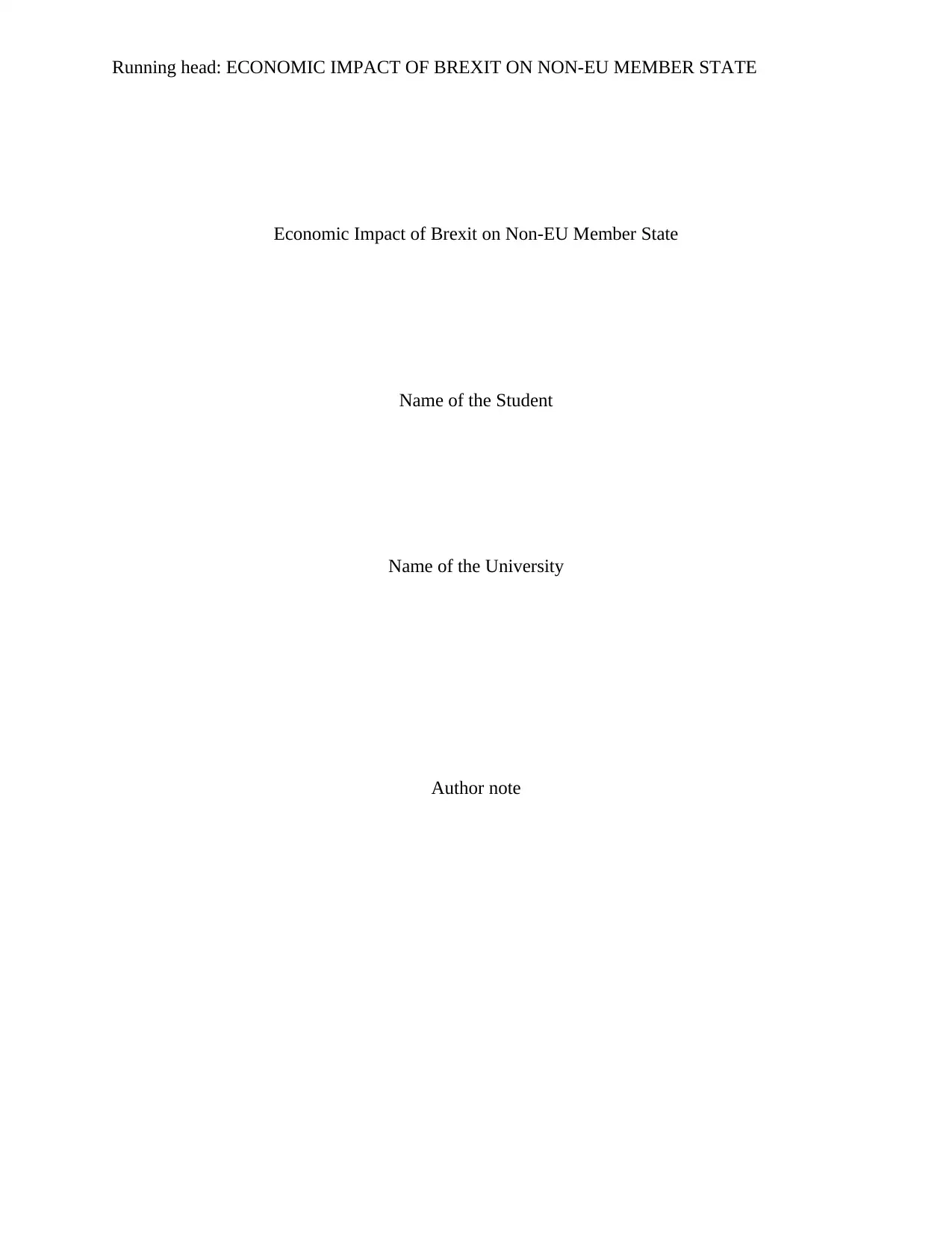
Running head: ECONOMIC IMPACT OF BREXIT ON NON-EU MEMBER STATE
Economic Impact of Brexit on Non-EU Member State
Name of the Student
Name of the University
Author note
Economic Impact of Brexit on Non-EU Member State
Name of the Student
Name of the University
Author note
Paraphrase This Document
Need a fresh take? Get an instant paraphrase of this document with our AI Paraphraser
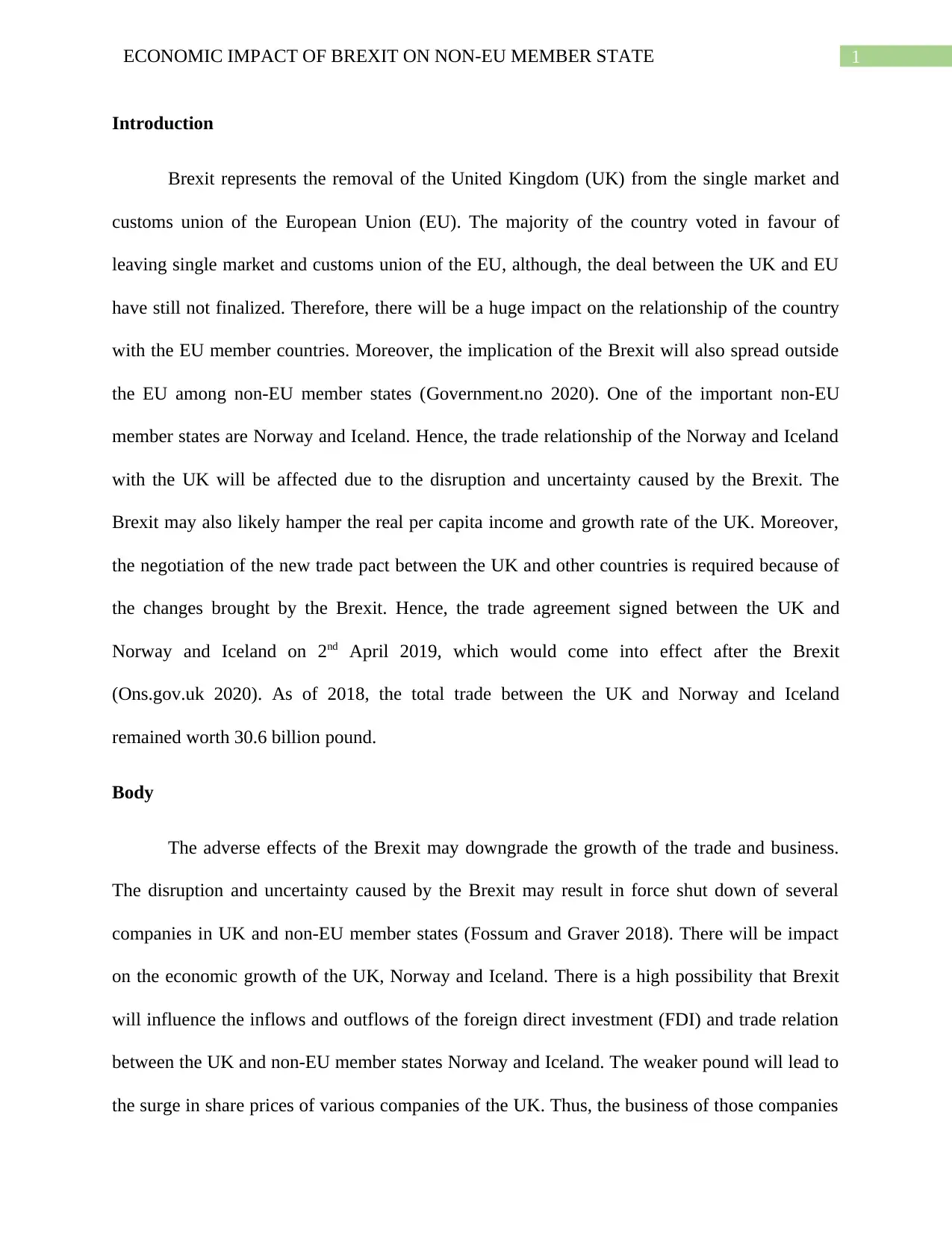
1ECONOMIC IMPACT OF BREXIT ON NON-EU MEMBER STATE
Introduction
Brexit represents the removal of the United Kingdom (UK) from the single market and
customs union of the European Union (EU). The majority of the country voted in favour of
leaving single market and customs union of the EU, although, the deal between the UK and EU
have still not finalized. Therefore, there will be a huge impact on the relationship of the country
with the EU member countries. Moreover, the implication of the Brexit will also spread outside
the EU among non-EU member states (Government.no 2020). One of the important non-EU
member states are Norway and Iceland. Hence, the trade relationship of the Norway and Iceland
with the UK will be affected due to the disruption and uncertainty caused by the Brexit. The
Brexit may also likely hamper the real per capita income and growth rate of the UK. Moreover,
the negotiation of the new trade pact between the UK and other countries is required because of
the changes brought by the Brexit. Hence, the trade agreement signed between the UK and
Norway and Iceland on 2nd April 2019, which would come into effect after the Brexit
(Ons.gov.uk 2020). As of 2018, the total trade between the UK and Norway and Iceland
remained worth 30.6 billion pound.
Body
The adverse effects of the Brexit may downgrade the growth of the trade and business.
The disruption and uncertainty caused by the Brexit may result in force shut down of several
companies in UK and non-EU member states (Fossum and Graver 2018). There will be impact
on the economic growth of the UK, Norway and Iceland. There is a high possibility that Brexit
will influence the inflows and outflows of the foreign direct investment (FDI) and trade relation
between the UK and non-EU member states Norway and Iceland. The weaker pound will lead to
the surge in share prices of various companies of the UK. Thus, the business of those companies
Introduction
Brexit represents the removal of the United Kingdom (UK) from the single market and
customs union of the European Union (EU). The majority of the country voted in favour of
leaving single market and customs union of the EU, although, the deal between the UK and EU
have still not finalized. Therefore, there will be a huge impact on the relationship of the country
with the EU member countries. Moreover, the implication of the Brexit will also spread outside
the EU among non-EU member states (Government.no 2020). One of the important non-EU
member states are Norway and Iceland. Hence, the trade relationship of the Norway and Iceland
with the UK will be affected due to the disruption and uncertainty caused by the Brexit. The
Brexit may also likely hamper the real per capita income and growth rate of the UK. Moreover,
the negotiation of the new trade pact between the UK and other countries is required because of
the changes brought by the Brexit. Hence, the trade agreement signed between the UK and
Norway and Iceland on 2nd April 2019, which would come into effect after the Brexit
(Ons.gov.uk 2020). As of 2018, the total trade between the UK and Norway and Iceland
remained worth 30.6 billion pound.
Body
The adverse effects of the Brexit may downgrade the growth of the trade and business.
The disruption and uncertainty caused by the Brexit may result in force shut down of several
companies in UK and non-EU member states (Fossum and Graver 2018). There will be impact
on the economic growth of the UK, Norway and Iceland. There is a high possibility that Brexit
will influence the inflows and outflows of the foreign direct investment (FDI) and trade relation
between the UK and non-EU member states Norway and Iceland. The weaker pound will lead to
the surge in share prices of various companies of the UK. Thus, the business of those companies
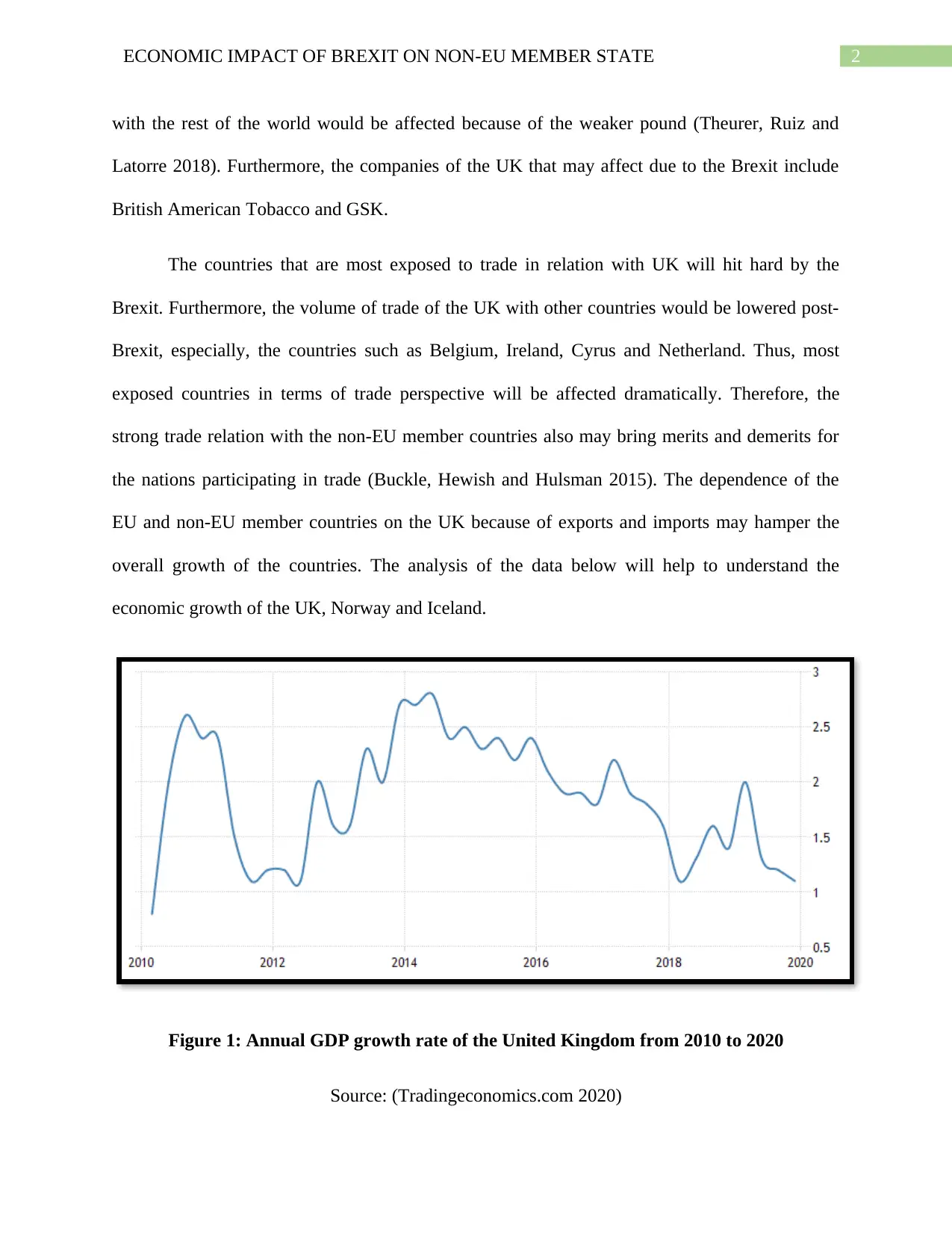
2ECONOMIC IMPACT OF BREXIT ON NON-EU MEMBER STATE
with the rest of the world would be affected because of the weaker pound (Theurer, Ruiz and
Latorre 2018). Furthermore, the companies of the UK that may affect due to the Brexit include
British American Tobacco and GSK.
The countries that are most exposed to trade in relation with UK will hit hard by the
Brexit. Furthermore, the volume of trade of the UK with other countries would be lowered post-
Brexit, especially, the countries such as Belgium, Ireland, Cyrus and Netherland. Thus, most
exposed countries in terms of trade perspective will be affected dramatically. Therefore, the
strong trade relation with the non-EU member countries also may bring merits and demerits for
the nations participating in trade (Buckle, Hewish and Hulsman 2015). The dependence of the
EU and non-EU member countries on the UK because of exports and imports may hamper the
overall growth of the countries. The analysis of the data below will help to understand the
economic growth of the UK, Norway and Iceland.
Figure 1: Annual GDP growth rate of the United Kingdom from 2010 to 2020
Source: (Tradingeconomics.com 2020)
with the rest of the world would be affected because of the weaker pound (Theurer, Ruiz and
Latorre 2018). Furthermore, the companies of the UK that may affect due to the Brexit include
British American Tobacco and GSK.
The countries that are most exposed to trade in relation with UK will hit hard by the
Brexit. Furthermore, the volume of trade of the UK with other countries would be lowered post-
Brexit, especially, the countries such as Belgium, Ireland, Cyrus and Netherland. Thus, most
exposed countries in terms of trade perspective will be affected dramatically. Therefore, the
strong trade relation with the non-EU member countries also may bring merits and demerits for
the nations participating in trade (Buckle, Hewish and Hulsman 2015). The dependence of the
EU and non-EU member countries on the UK because of exports and imports may hamper the
overall growth of the countries. The analysis of the data below will help to understand the
economic growth of the UK, Norway and Iceland.
Figure 1: Annual GDP growth rate of the United Kingdom from 2010 to 2020
Source: (Tradingeconomics.com 2020)
⊘ This is a preview!⊘
Do you want full access?
Subscribe today to unlock all pages.

Trusted by 1+ million students worldwide
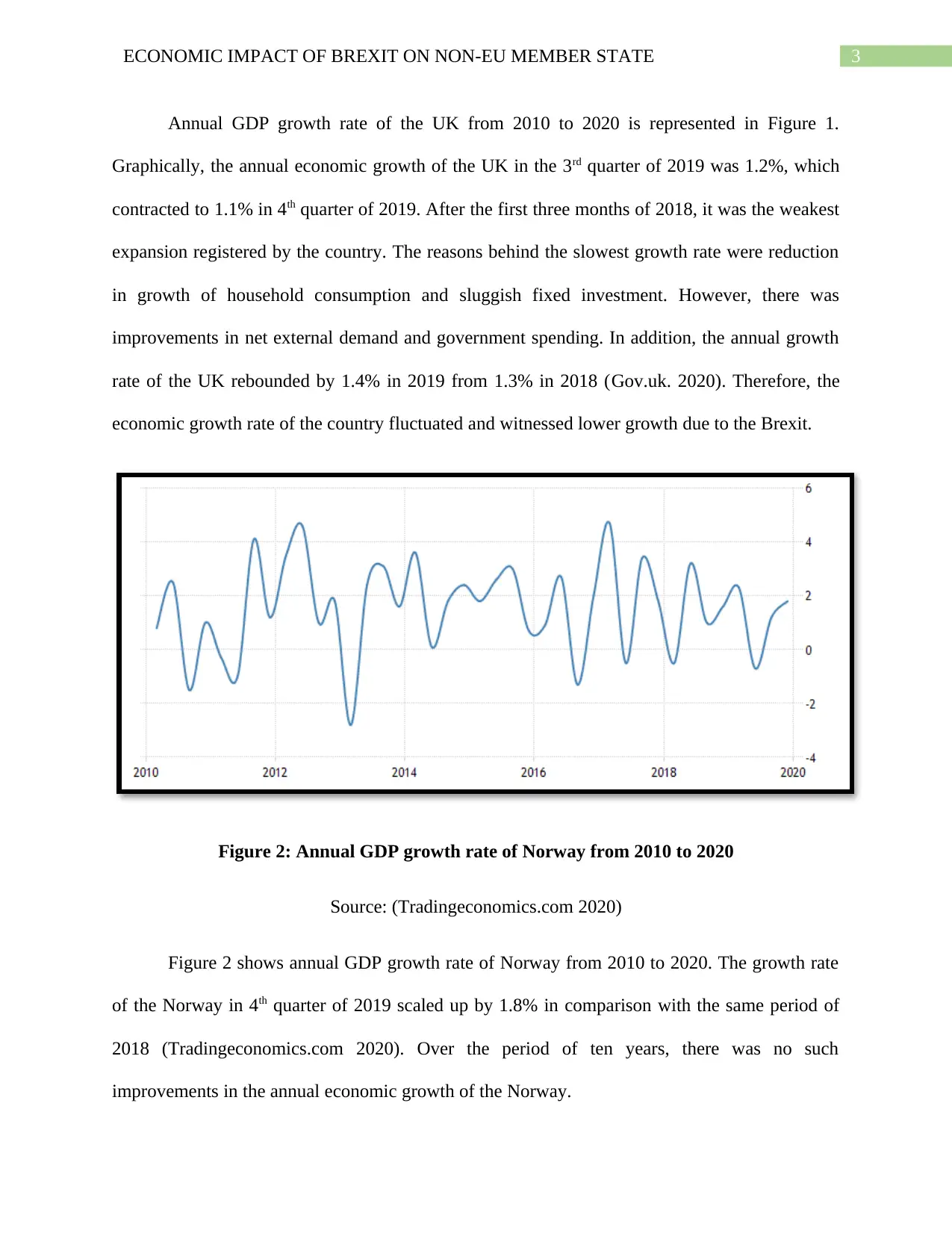
3ECONOMIC IMPACT OF BREXIT ON NON-EU MEMBER STATE
Annual GDP growth rate of the UK from 2010 to 2020 is represented in Figure 1.
Graphically, the annual economic growth of the UK in the 3rd quarter of 2019 was 1.2%, which
contracted to 1.1% in 4th quarter of 2019. After the first three months of 2018, it was the weakest
expansion registered by the country. The reasons behind the slowest growth rate were reduction
in growth of household consumption and sluggish fixed investment. However, there was
improvements in net external demand and government spending. In addition, the annual growth
rate of the UK rebounded by 1.4% in 2019 from 1.3% in 2018 (Gov.uk. 2020). Therefore, the
economic growth rate of the country fluctuated and witnessed lower growth due to the Brexit.
Figure 2: Annual GDP growth rate of Norway from 2010 to 2020
Source: (Tradingeconomics.com 2020)
Figure 2 shows annual GDP growth rate of Norway from 2010 to 2020. The growth rate
of the Norway in 4th quarter of 2019 scaled up by 1.8% in comparison with the same period of
2018 (Tradingeconomics.com 2020). Over the period of ten years, there was no such
improvements in the annual economic growth of the Norway.
Annual GDP growth rate of the UK from 2010 to 2020 is represented in Figure 1.
Graphically, the annual economic growth of the UK in the 3rd quarter of 2019 was 1.2%, which
contracted to 1.1% in 4th quarter of 2019. After the first three months of 2018, it was the weakest
expansion registered by the country. The reasons behind the slowest growth rate were reduction
in growth of household consumption and sluggish fixed investment. However, there was
improvements in net external demand and government spending. In addition, the annual growth
rate of the UK rebounded by 1.4% in 2019 from 1.3% in 2018 (Gov.uk. 2020). Therefore, the
economic growth rate of the country fluctuated and witnessed lower growth due to the Brexit.
Figure 2: Annual GDP growth rate of Norway from 2010 to 2020
Source: (Tradingeconomics.com 2020)
Figure 2 shows annual GDP growth rate of Norway from 2010 to 2020. The growth rate
of the Norway in 4th quarter of 2019 scaled up by 1.8% in comparison with the same period of
2018 (Tradingeconomics.com 2020). Over the period of ten years, there was no such
improvements in the annual economic growth of the Norway.
Paraphrase This Document
Need a fresh take? Get an instant paraphrase of this document with our AI Paraphraser
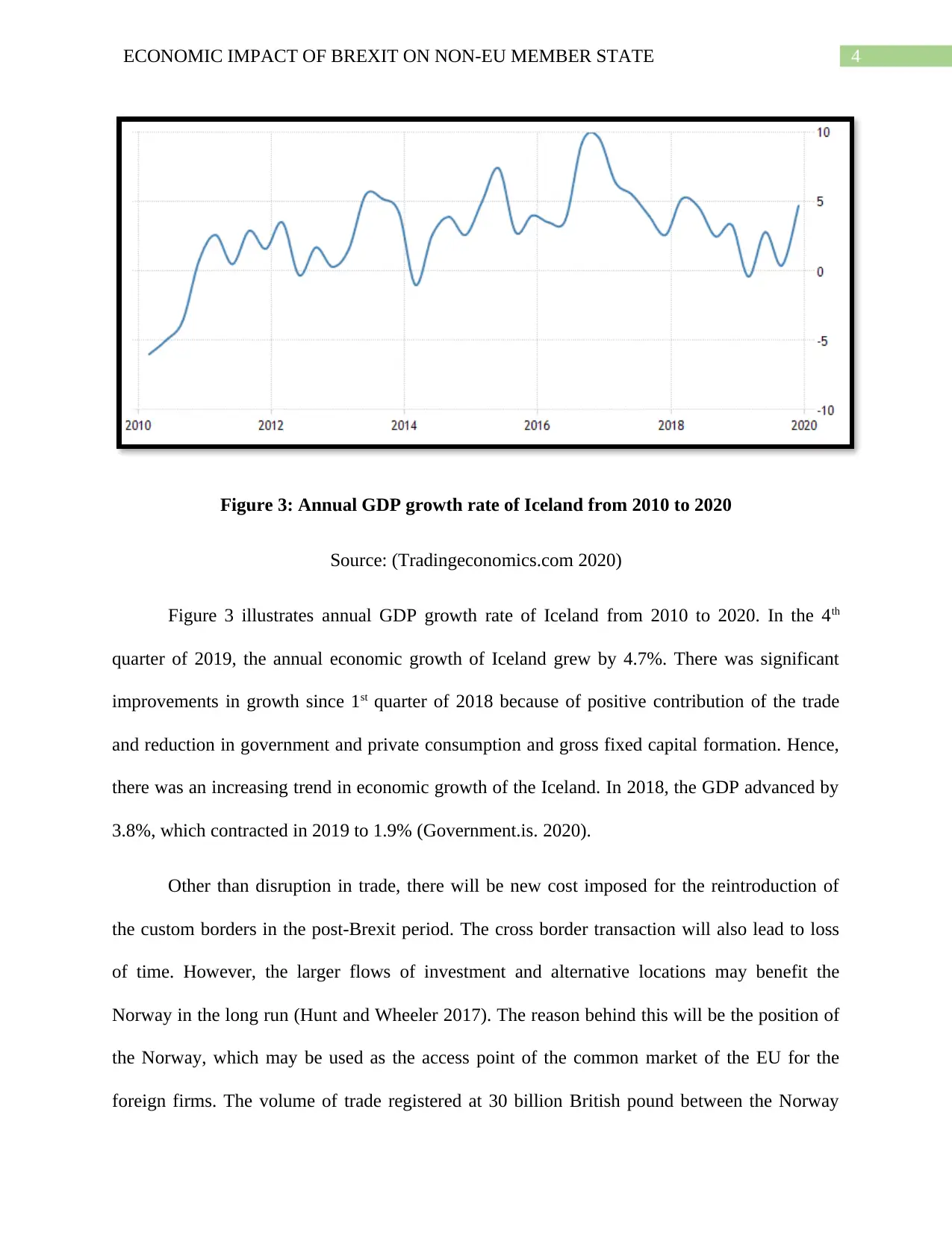
4ECONOMIC IMPACT OF BREXIT ON NON-EU MEMBER STATE
Figure 3: Annual GDP growth rate of Iceland from 2010 to 2020
Source: (Tradingeconomics.com 2020)
Figure 3 illustrates annual GDP growth rate of Iceland from 2010 to 2020. In the 4th
quarter of 2019, the annual economic growth of Iceland grew by 4.7%. There was significant
improvements in growth since 1st quarter of 2018 because of positive contribution of the trade
and reduction in government and private consumption and gross fixed capital formation. Hence,
there was an increasing trend in economic growth of the Iceland. In 2018, the GDP advanced by
3.8%, which contracted in 2019 to 1.9% (Government.is. 2020).
Other than disruption in trade, there will be new cost imposed for the reintroduction of
the custom borders in the post-Brexit period. The cross border transaction will also lead to loss
of time. However, the larger flows of investment and alternative locations may benefit the
Norway in the long run (Hunt and Wheeler 2017). The reason behind this will be the position of
the Norway, which may be used as the access point of the common market of the EU for the
foreign firms. The volume of trade registered at 30 billion British pound between the Norway
Figure 3: Annual GDP growth rate of Iceland from 2010 to 2020
Source: (Tradingeconomics.com 2020)
Figure 3 illustrates annual GDP growth rate of Iceland from 2010 to 2020. In the 4th
quarter of 2019, the annual economic growth of Iceland grew by 4.7%. There was significant
improvements in growth since 1st quarter of 2018 because of positive contribution of the trade
and reduction in government and private consumption and gross fixed capital formation. Hence,
there was an increasing trend in economic growth of the Iceland. In 2018, the GDP advanced by
3.8%, which contracted in 2019 to 1.9% (Government.is. 2020).
Other than disruption in trade, there will be new cost imposed for the reintroduction of
the custom borders in the post-Brexit period. The cross border transaction will also lead to loss
of time. However, the larger flows of investment and alternative locations may benefit the
Norway in the long run (Hunt and Wheeler 2017). The reason behind this will be the position of
the Norway, which may be used as the access point of the common market of the EU for the
foreign firms. The volume of trade registered at 30 billion British pound between the Norway
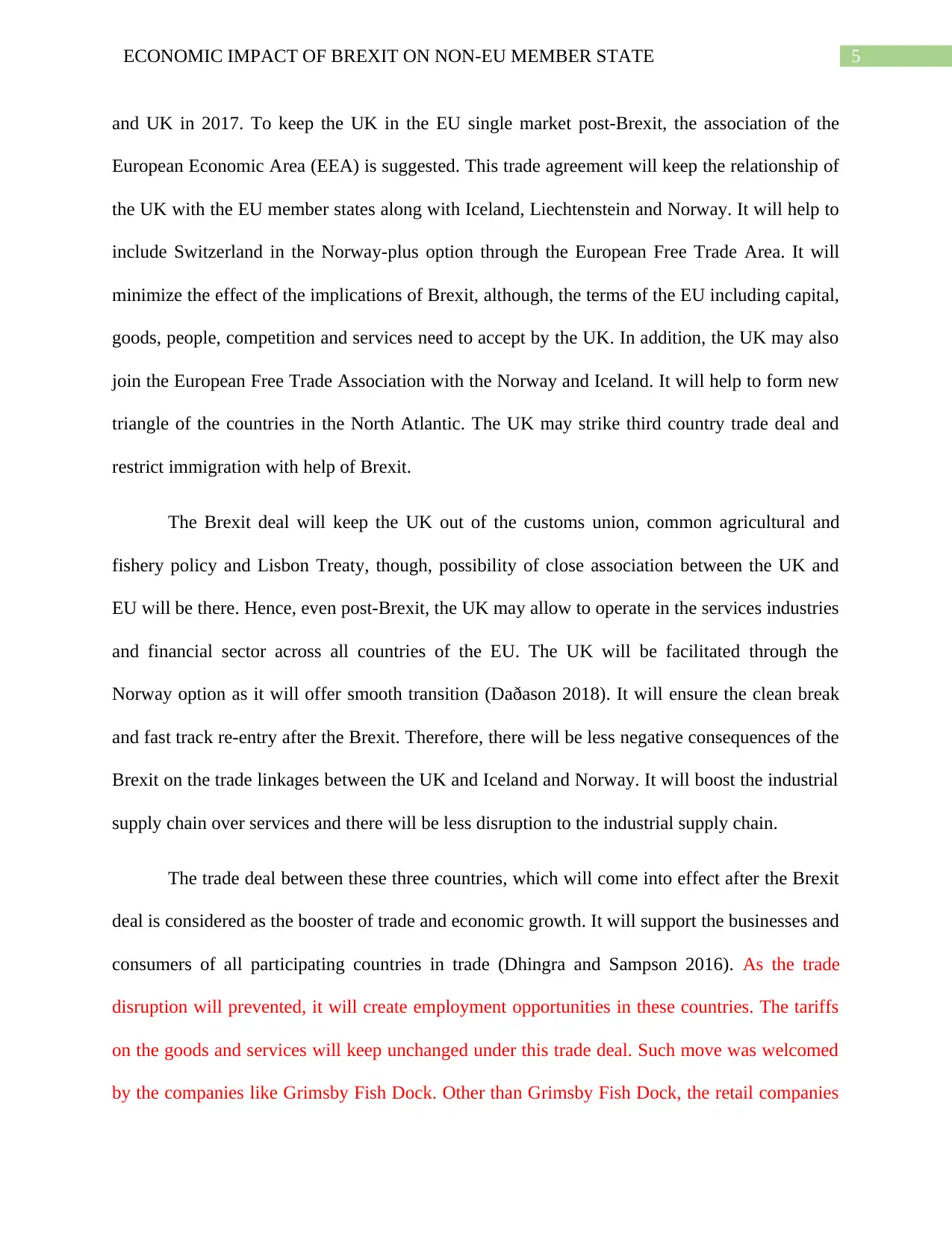
5ECONOMIC IMPACT OF BREXIT ON NON-EU MEMBER STATE
and UK in 2017. To keep the UK in the EU single market post-Brexit, the association of the
European Economic Area (EEA) is suggested. This trade agreement will keep the relationship of
the UK with the EU member states along with Iceland, Liechtenstein and Norway. It will help to
include Switzerland in the Norway-plus option through the European Free Trade Area. It will
minimize the effect of the implications of Brexit, although, the terms of the EU including capital,
goods, people, competition and services need to accept by the UK. In addition, the UK may also
join the European Free Trade Association with the Norway and Iceland. It will help to form new
triangle of the countries in the North Atlantic. The UK may strike third country trade deal and
restrict immigration with help of Brexit.
The Brexit deal will keep the UK out of the customs union, common agricultural and
fishery policy and Lisbon Treaty, though, possibility of close association between the UK and
EU will be there. Hence, even post-Brexit, the UK may allow to operate in the services industries
and financial sector across all countries of the EU. The UK will be facilitated through the
Norway option as it will offer smooth transition (Daðason 2018). It will ensure the clean break
and fast track re-entry after the Brexit. Therefore, there will be less negative consequences of the
Brexit on the trade linkages between the UK and Iceland and Norway. It will boost the industrial
supply chain over services and there will be less disruption to the industrial supply chain.
The trade deal between these three countries, which will come into effect after the Brexit
deal is considered as the booster of trade and economic growth. It will support the businesses and
consumers of all participating countries in trade (Dhingra and Sampson 2016). As the trade
disruption will prevented, it will create employment opportunities in these countries. The tariffs
on the goods and services will keep unchanged under this trade deal. Such move was welcomed
by the companies like Grimsby Fish Dock. Other than Grimsby Fish Dock, the retail companies
and UK in 2017. To keep the UK in the EU single market post-Brexit, the association of the
European Economic Area (EEA) is suggested. This trade agreement will keep the relationship of
the UK with the EU member states along with Iceland, Liechtenstein and Norway. It will help to
include Switzerland in the Norway-plus option through the European Free Trade Area. It will
minimize the effect of the implications of Brexit, although, the terms of the EU including capital,
goods, people, competition and services need to accept by the UK. In addition, the UK may also
join the European Free Trade Association with the Norway and Iceland. It will help to form new
triangle of the countries in the North Atlantic. The UK may strike third country trade deal and
restrict immigration with help of Brexit.
The Brexit deal will keep the UK out of the customs union, common agricultural and
fishery policy and Lisbon Treaty, though, possibility of close association between the UK and
EU will be there. Hence, even post-Brexit, the UK may allow to operate in the services industries
and financial sector across all countries of the EU. The UK will be facilitated through the
Norway option as it will offer smooth transition (Daðason 2018). It will ensure the clean break
and fast track re-entry after the Brexit. Therefore, there will be less negative consequences of the
Brexit on the trade linkages between the UK and Iceland and Norway. It will boost the industrial
supply chain over services and there will be less disruption to the industrial supply chain.
The trade deal between these three countries, which will come into effect after the Brexit
deal is considered as the booster of trade and economic growth. It will support the businesses and
consumers of all participating countries in trade (Dhingra and Sampson 2016). As the trade
disruption will prevented, it will create employment opportunities in these countries. The tariffs
on the goods and services will keep unchanged under this trade deal. Such move was welcomed
by the companies like Grimsby Fish Dock. Other than Grimsby Fish Dock, the retail companies
⊘ This is a preview!⊘
Do you want full access?
Subscribe today to unlock all pages.

Trusted by 1+ million students worldwide
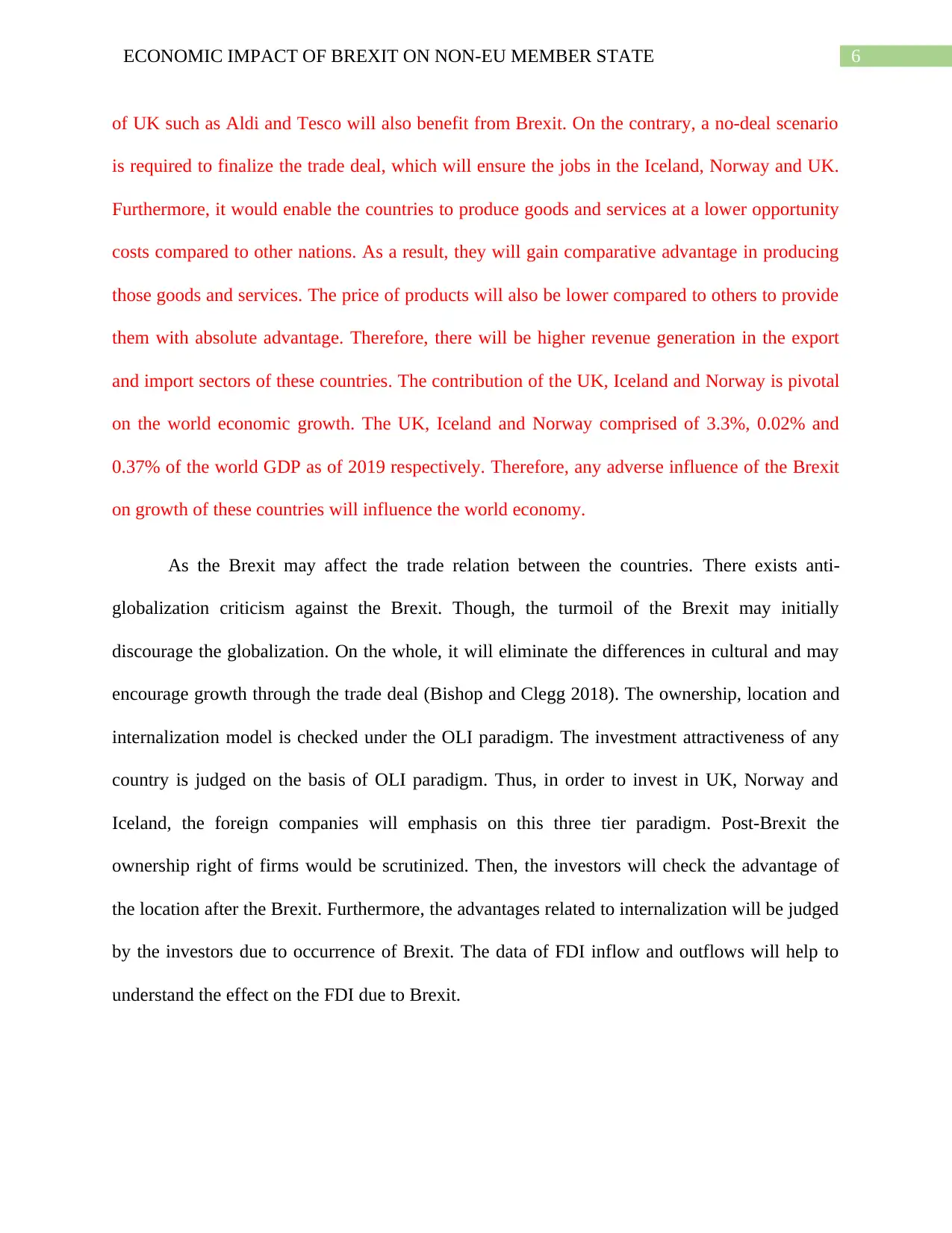
6ECONOMIC IMPACT OF BREXIT ON NON-EU MEMBER STATE
of UK such as Aldi and Tesco will also benefit from Brexit. On the contrary, a no-deal scenario
is required to finalize the trade deal, which will ensure the jobs in the Iceland, Norway and UK.
Furthermore, it would enable the countries to produce goods and services at a lower opportunity
costs compared to other nations. As a result, they will gain comparative advantage in producing
those goods and services. The price of products will also be lower compared to others to provide
them with absolute advantage. Therefore, there will be higher revenue generation in the export
and import sectors of these countries. The contribution of the UK, Iceland and Norway is pivotal
on the world economic growth. The UK, Iceland and Norway comprised of 3.3%, 0.02% and
0.37% of the world GDP as of 2019 respectively. Therefore, any adverse influence of the Brexit
on growth of these countries will influence the world economy.
As the Brexit may affect the trade relation between the countries. There exists anti-
globalization criticism against the Brexit. Though, the turmoil of the Brexit may initially
discourage the globalization. On the whole, it will eliminate the differences in cultural and may
encourage growth through the trade deal (Bishop and Clegg 2018). The ownership, location and
internalization model is checked under the OLI paradigm. The investment attractiveness of any
country is judged on the basis of OLI paradigm. Thus, in order to invest in UK, Norway and
Iceland, the foreign companies will emphasis on this three tier paradigm. Post-Brexit the
ownership right of firms would be scrutinized. Then, the investors will check the advantage of
the location after the Brexit. Furthermore, the advantages related to internalization will be judged
by the investors due to occurrence of Brexit. The data of FDI inflow and outflows will help to
understand the effect on the FDI due to Brexit.
of UK such as Aldi and Tesco will also benefit from Brexit. On the contrary, a no-deal scenario
is required to finalize the trade deal, which will ensure the jobs in the Iceland, Norway and UK.
Furthermore, it would enable the countries to produce goods and services at a lower opportunity
costs compared to other nations. As a result, they will gain comparative advantage in producing
those goods and services. The price of products will also be lower compared to others to provide
them with absolute advantage. Therefore, there will be higher revenue generation in the export
and import sectors of these countries. The contribution of the UK, Iceland and Norway is pivotal
on the world economic growth. The UK, Iceland and Norway comprised of 3.3%, 0.02% and
0.37% of the world GDP as of 2019 respectively. Therefore, any adverse influence of the Brexit
on growth of these countries will influence the world economy.
As the Brexit may affect the trade relation between the countries. There exists anti-
globalization criticism against the Brexit. Though, the turmoil of the Brexit may initially
discourage the globalization. On the whole, it will eliminate the differences in cultural and may
encourage growth through the trade deal (Bishop and Clegg 2018). The ownership, location and
internalization model is checked under the OLI paradigm. The investment attractiveness of any
country is judged on the basis of OLI paradigm. Thus, in order to invest in UK, Norway and
Iceland, the foreign companies will emphasis on this three tier paradigm. Post-Brexit the
ownership right of firms would be scrutinized. Then, the investors will check the advantage of
the location after the Brexit. Furthermore, the advantages related to internalization will be judged
by the investors due to occurrence of Brexit. The data of FDI inflow and outflows will help to
understand the effect on the FDI due to Brexit.
Paraphrase This Document
Need a fresh take? Get an instant paraphrase of this document with our AI Paraphraser
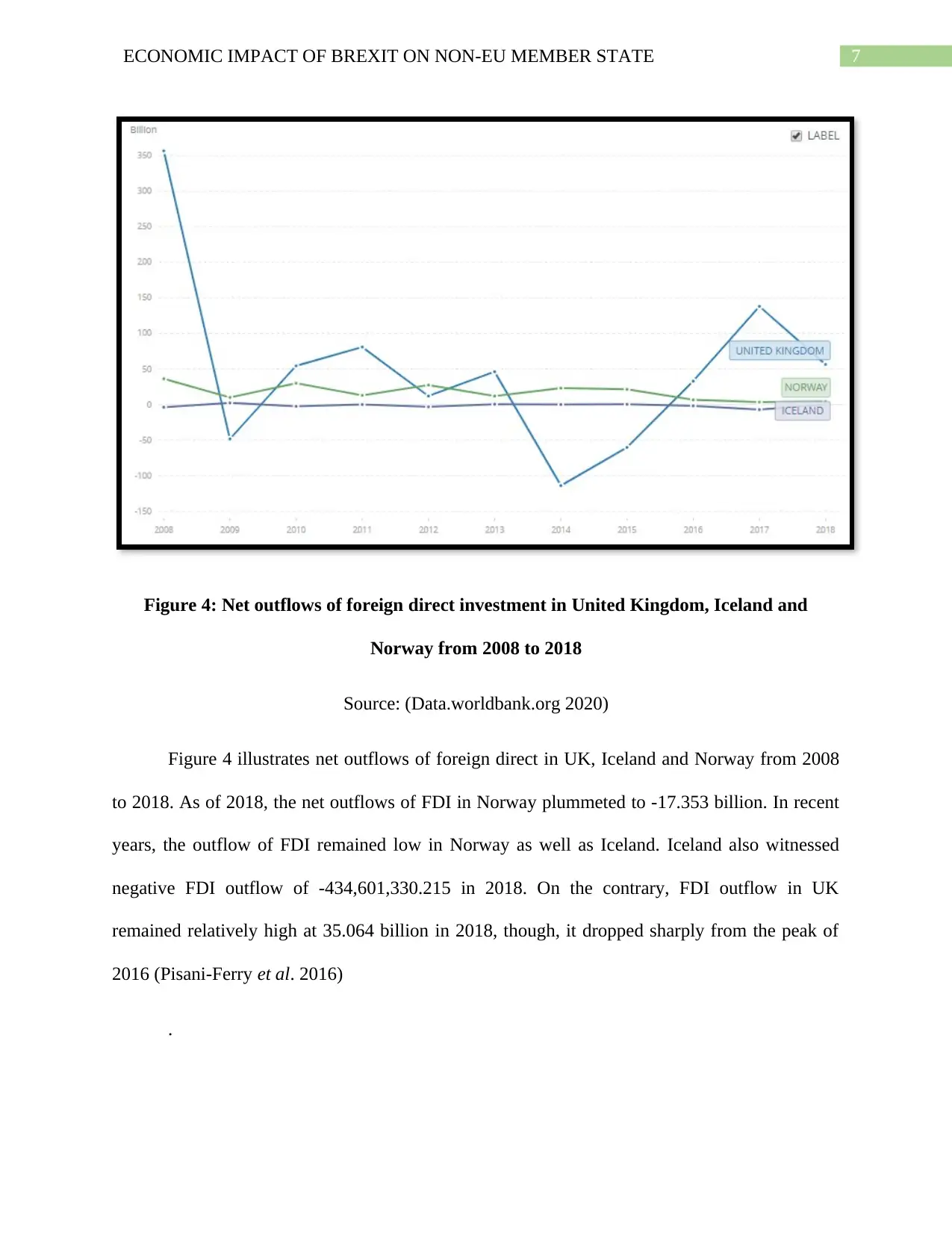
7ECONOMIC IMPACT OF BREXIT ON NON-EU MEMBER STATE
Figure 4: Net outflows of foreign direct investment in United Kingdom, Iceland and
Norway from 2008 to 2018
Source: (Data.worldbank.org 2020)
Figure 4 illustrates net outflows of foreign direct in UK, Iceland and Norway from 2008
to 2018. As of 2018, the net outflows of FDI in Norway plummeted to -17.353 billion. In recent
years, the outflow of FDI remained low in Norway as well as Iceland. Iceland also witnessed
negative FDI outflow of -434,601,330.215 in 2018. On the contrary, FDI outflow in UK
remained relatively high at 35.064 billion in 2018, though, it dropped sharply from the peak of
2016 (Pisani-Ferry et al. 2016)
.
Figure 4: Net outflows of foreign direct investment in United Kingdom, Iceland and
Norway from 2008 to 2018
Source: (Data.worldbank.org 2020)
Figure 4 illustrates net outflows of foreign direct in UK, Iceland and Norway from 2008
to 2018. As of 2018, the net outflows of FDI in Norway plummeted to -17.353 billion. In recent
years, the outflow of FDI remained low in Norway as well as Iceland. Iceland also witnessed
negative FDI outflow of -434,601,330.215 in 2018. On the contrary, FDI outflow in UK
remained relatively high at 35.064 billion in 2018, though, it dropped sharply from the peak of
2016 (Pisani-Ferry et al. 2016)
.
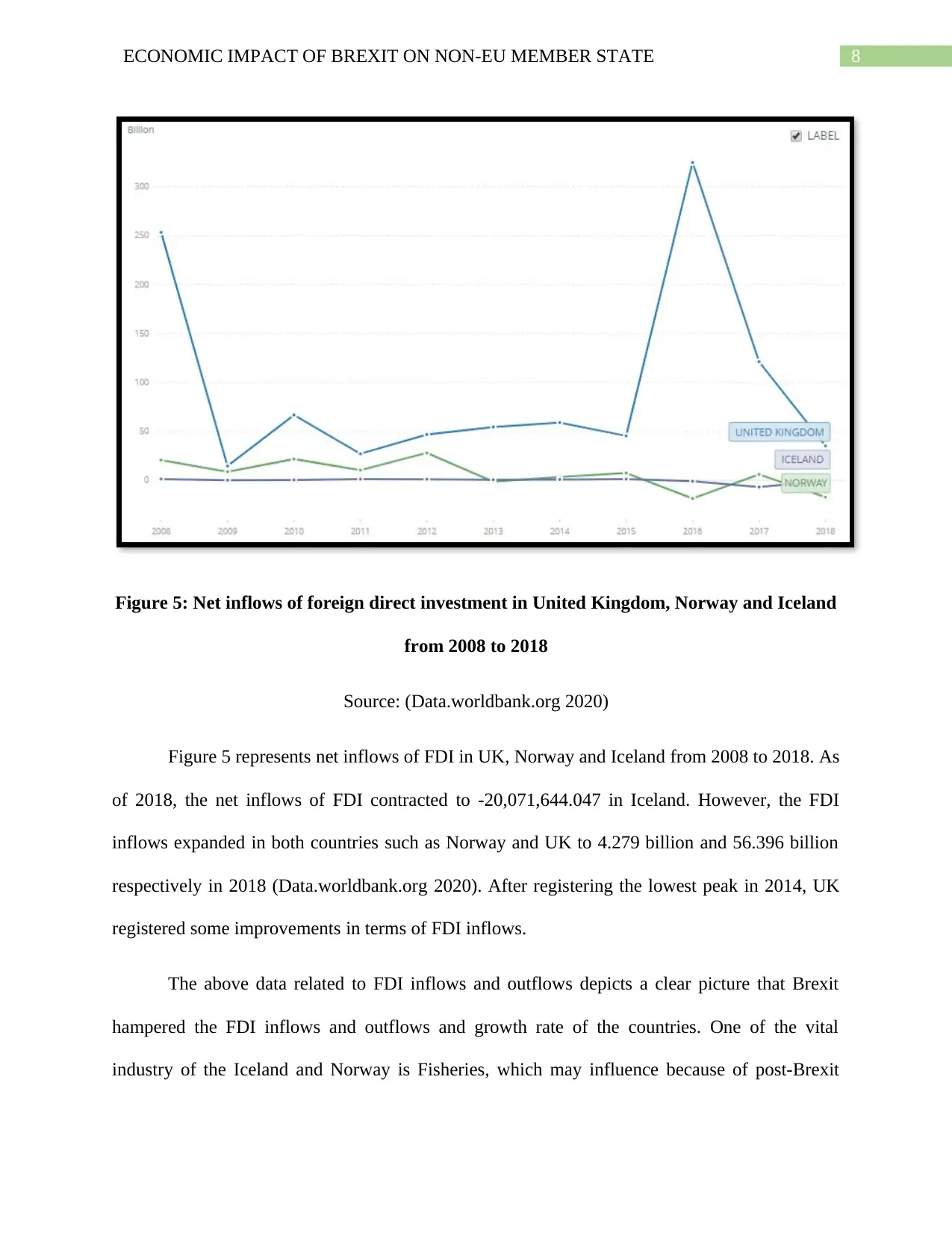
8ECONOMIC IMPACT OF BREXIT ON NON-EU MEMBER STATE
Figure 5: Net inflows of foreign direct investment in United Kingdom, Norway and Iceland
from 2008 to 2018
Source: (Data.worldbank.org 2020)
Figure 5 represents net inflows of FDI in UK, Norway and Iceland from 2008 to 2018. As
of 2018, the net inflows of FDI contracted to -20,071,644.047 in Iceland. However, the FDI
inflows expanded in both countries such as Norway and UK to 4.279 billion and 56.396 billion
respectively in 2018 (Data.worldbank.org 2020). After registering the lowest peak in 2014, UK
registered some improvements in terms of FDI inflows.
The above data related to FDI inflows and outflows depicts a clear picture that Brexit
hampered the FDI inflows and outflows and growth rate of the countries. One of the vital
industry of the Iceland and Norway is Fisheries, which may influence because of post-Brexit
Figure 5: Net inflows of foreign direct investment in United Kingdom, Norway and Iceland
from 2008 to 2018
Source: (Data.worldbank.org 2020)
Figure 5 represents net inflows of FDI in UK, Norway and Iceland from 2008 to 2018. As
of 2018, the net inflows of FDI contracted to -20,071,644.047 in Iceland. However, the FDI
inflows expanded in both countries such as Norway and UK to 4.279 billion and 56.396 billion
respectively in 2018 (Data.worldbank.org 2020). After registering the lowest peak in 2014, UK
registered some improvements in terms of FDI inflows.
The above data related to FDI inflows and outflows depicts a clear picture that Brexit
hampered the FDI inflows and outflows and growth rate of the countries. One of the vital
industry of the Iceland and Norway is Fisheries, which may influence because of post-Brexit
⊘ This is a preview!⊘
Do you want full access?
Subscribe today to unlock all pages.

Trusted by 1+ million students worldwide
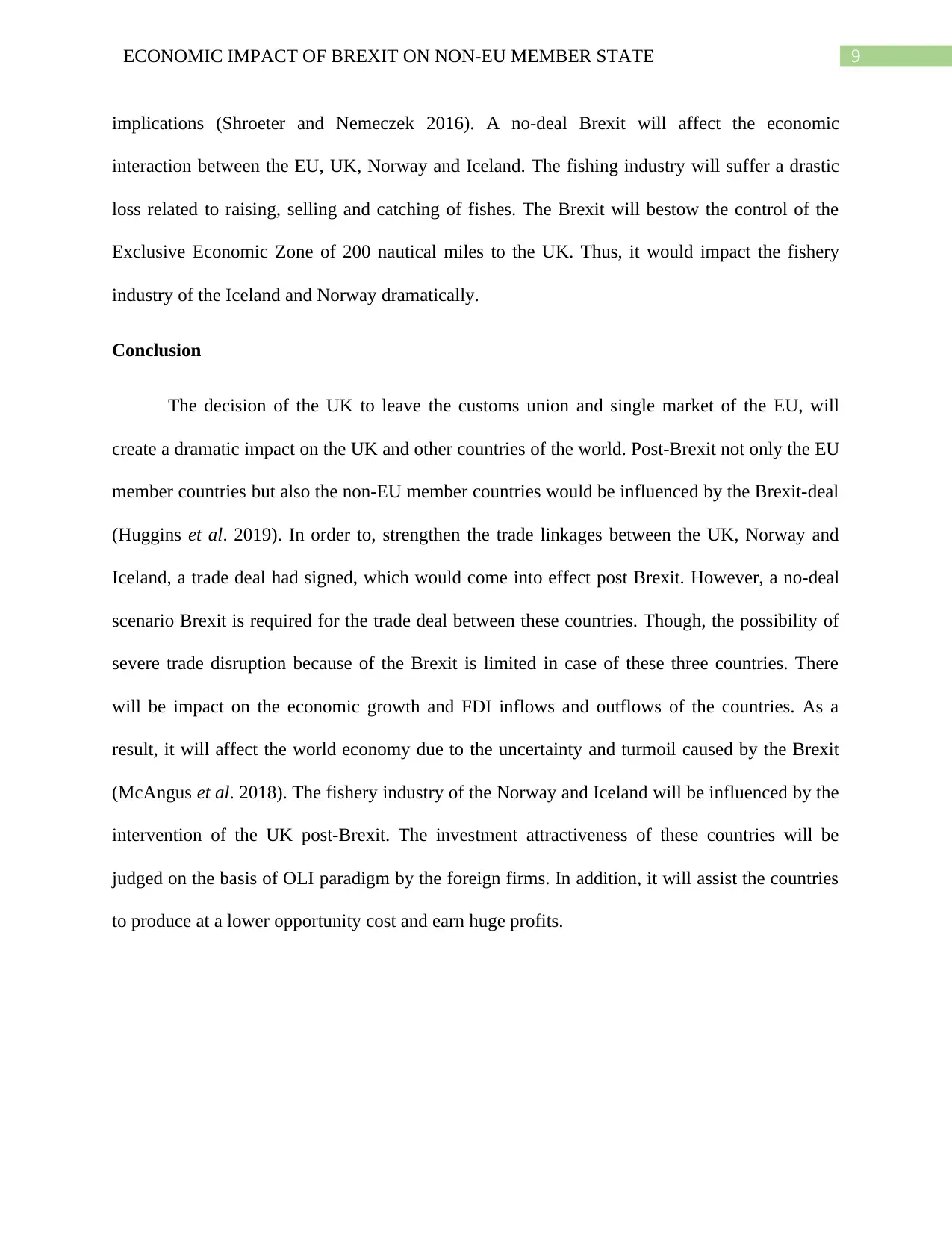
9ECONOMIC IMPACT OF BREXIT ON NON-EU MEMBER STATE
implications (Shroeter and Nemeczek 2016). A no-deal Brexit will affect the economic
interaction between the EU, UK, Norway and Iceland. The fishing industry will suffer a drastic
loss related to raising, selling and catching of fishes. The Brexit will bestow the control of the
Exclusive Economic Zone of 200 nautical miles to the UK. Thus, it would impact the fishery
industry of the Iceland and Norway dramatically.
Conclusion
The decision of the UK to leave the customs union and single market of the EU, will
create a dramatic impact on the UK and other countries of the world. Post-Brexit not only the EU
member countries but also the non-EU member countries would be influenced by the Brexit-deal
(Huggins et al. 2019). In order to, strengthen the trade linkages between the UK, Norway and
Iceland, a trade deal had signed, which would come into effect post Brexit. However, a no-deal
scenario Brexit is required for the trade deal between these countries. Though, the possibility of
severe trade disruption because of the Brexit is limited in case of these three countries. There
will be impact on the economic growth and FDI inflows and outflows of the countries. As a
result, it will affect the world economy due to the uncertainty and turmoil caused by the Brexit
(McAngus et al. 2018). The fishery industry of the Norway and Iceland will be influenced by the
intervention of the UK post-Brexit. The investment attractiveness of these countries will be
judged on the basis of OLI paradigm by the foreign firms. In addition, it will assist the countries
to produce at a lower opportunity cost and earn huge profits.
implications (Shroeter and Nemeczek 2016). A no-deal Brexit will affect the economic
interaction between the EU, UK, Norway and Iceland. The fishing industry will suffer a drastic
loss related to raising, selling and catching of fishes. The Brexit will bestow the control of the
Exclusive Economic Zone of 200 nautical miles to the UK. Thus, it would impact the fishery
industry of the Iceland and Norway dramatically.
Conclusion
The decision of the UK to leave the customs union and single market of the EU, will
create a dramatic impact on the UK and other countries of the world. Post-Brexit not only the EU
member countries but also the non-EU member countries would be influenced by the Brexit-deal
(Huggins et al. 2019). In order to, strengthen the trade linkages between the UK, Norway and
Iceland, a trade deal had signed, which would come into effect post Brexit. However, a no-deal
scenario Brexit is required for the trade deal between these countries. Though, the possibility of
severe trade disruption because of the Brexit is limited in case of these three countries. There
will be impact on the economic growth and FDI inflows and outflows of the countries. As a
result, it will affect the world economy due to the uncertainty and turmoil caused by the Brexit
(McAngus et al. 2018). The fishery industry of the Norway and Iceland will be influenced by the
intervention of the UK post-Brexit. The investment attractiveness of these countries will be
judged on the basis of OLI paradigm by the foreign firms. In addition, it will assist the countries
to produce at a lower opportunity cost and earn huge profits.
Paraphrase This Document
Need a fresh take? Get an instant paraphrase of this document with our AI Paraphraser
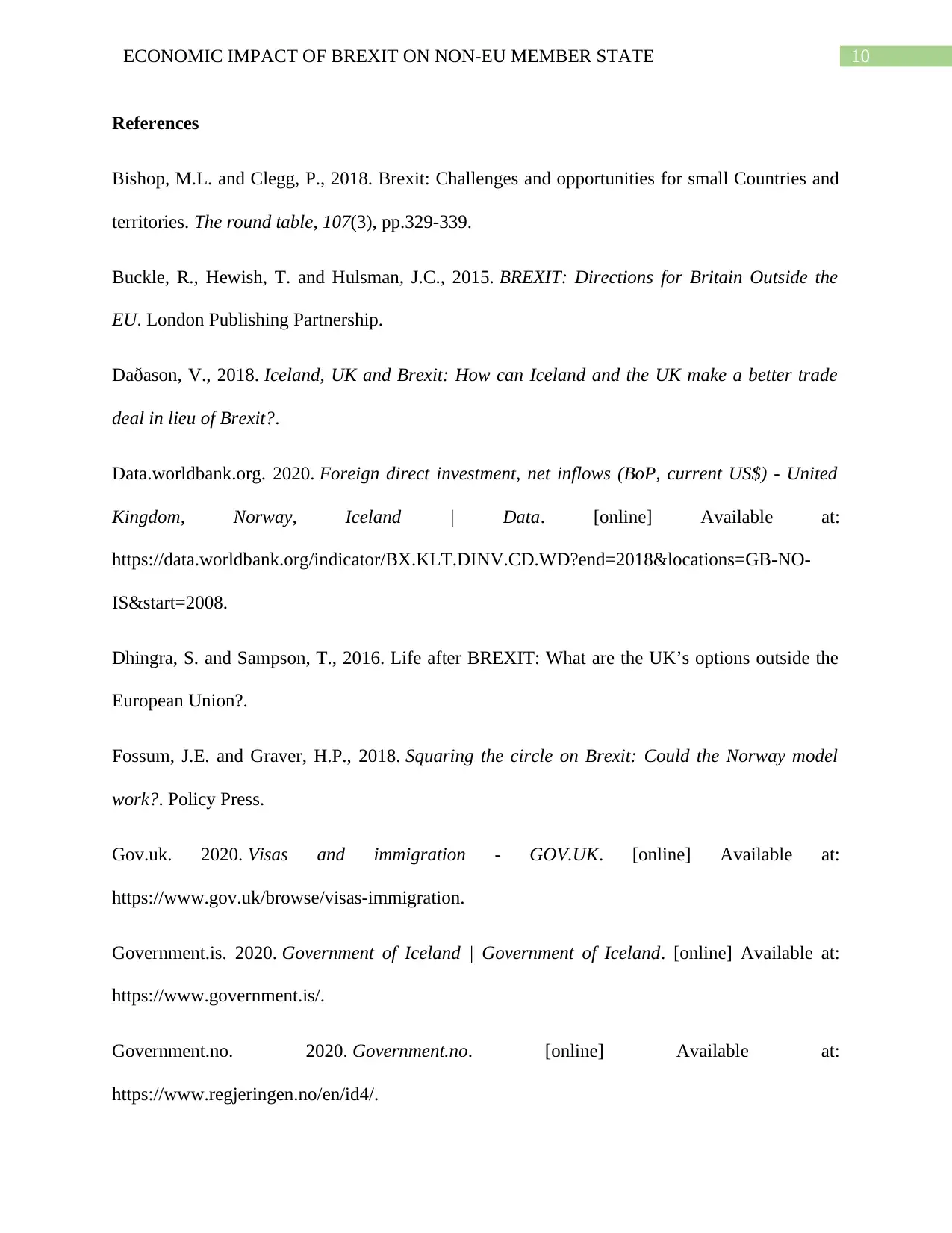
10ECONOMIC IMPACT OF BREXIT ON NON-EU MEMBER STATE
References
Bishop, M.L. and Clegg, P., 2018. Brexit: Challenges and opportunities for small Countries and
territories. The round table, 107(3), pp.329-339.
Buckle, R., Hewish, T. and Hulsman, J.C., 2015. BREXIT: Directions for Britain Outside the
EU. London Publishing Partnership.
Daðason, V., 2018. Iceland, UK and Brexit: How can Iceland and the UK make a better trade
deal in lieu of Brexit?.
Data.worldbank.org. 2020. Foreign direct investment, net inflows (BoP, current US$) - United
Kingdom, Norway, Iceland | Data. [online] Available at:
https://data.worldbank.org/indicator/BX.KLT.DINV.CD.WD?end=2018&locations=GB-NO-
IS&start=2008.
Dhingra, S. and Sampson, T., 2016. Life after BREXIT: What are the UK’s options outside the
European Union?.
Fossum, J.E. and Graver, H.P., 2018. Squaring the circle on Brexit: Could the Norway model
work?. Policy Press.
Gov.uk. 2020. Visas and immigration - GOV.UK. [online] Available at:
https://www.gov.uk/browse/visas-immigration.
Government.is. 2020. Government of Iceland | Government of Iceland. [online] Available at:
https://www.government.is/.
Government.no. 2020. Government.no. [online] Available at:
https://www.regjeringen.no/en/id4/.
References
Bishop, M.L. and Clegg, P., 2018. Brexit: Challenges and opportunities for small Countries and
territories. The round table, 107(3), pp.329-339.
Buckle, R., Hewish, T. and Hulsman, J.C., 2015. BREXIT: Directions for Britain Outside the
EU. London Publishing Partnership.
Daðason, V., 2018. Iceland, UK and Brexit: How can Iceland and the UK make a better trade
deal in lieu of Brexit?.
Data.worldbank.org. 2020. Foreign direct investment, net inflows (BoP, current US$) - United
Kingdom, Norway, Iceland | Data. [online] Available at:
https://data.worldbank.org/indicator/BX.KLT.DINV.CD.WD?end=2018&locations=GB-NO-
IS&start=2008.
Dhingra, S. and Sampson, T., 2016. Life after BREXIT: What are the UK’s options outside the
European Union?.
Fossum, J.E. and Graver, H.P., 2018. Squaring the circle on Brexit: Could the Norway model
work?. Policy Press.
Gov.uk. 2020. Visas and immigration - GOV.UK. [online] Available at:
https://www.gov.uk/browse/visas-immigration.
Government.is. 2020. Government of Iceland | Government of Iceland. [online] Available at:
https://www.government.is/.
Government.no. 2020. Government.no. [online] Available at:
https://www.regjeringen.no/en/id4/.
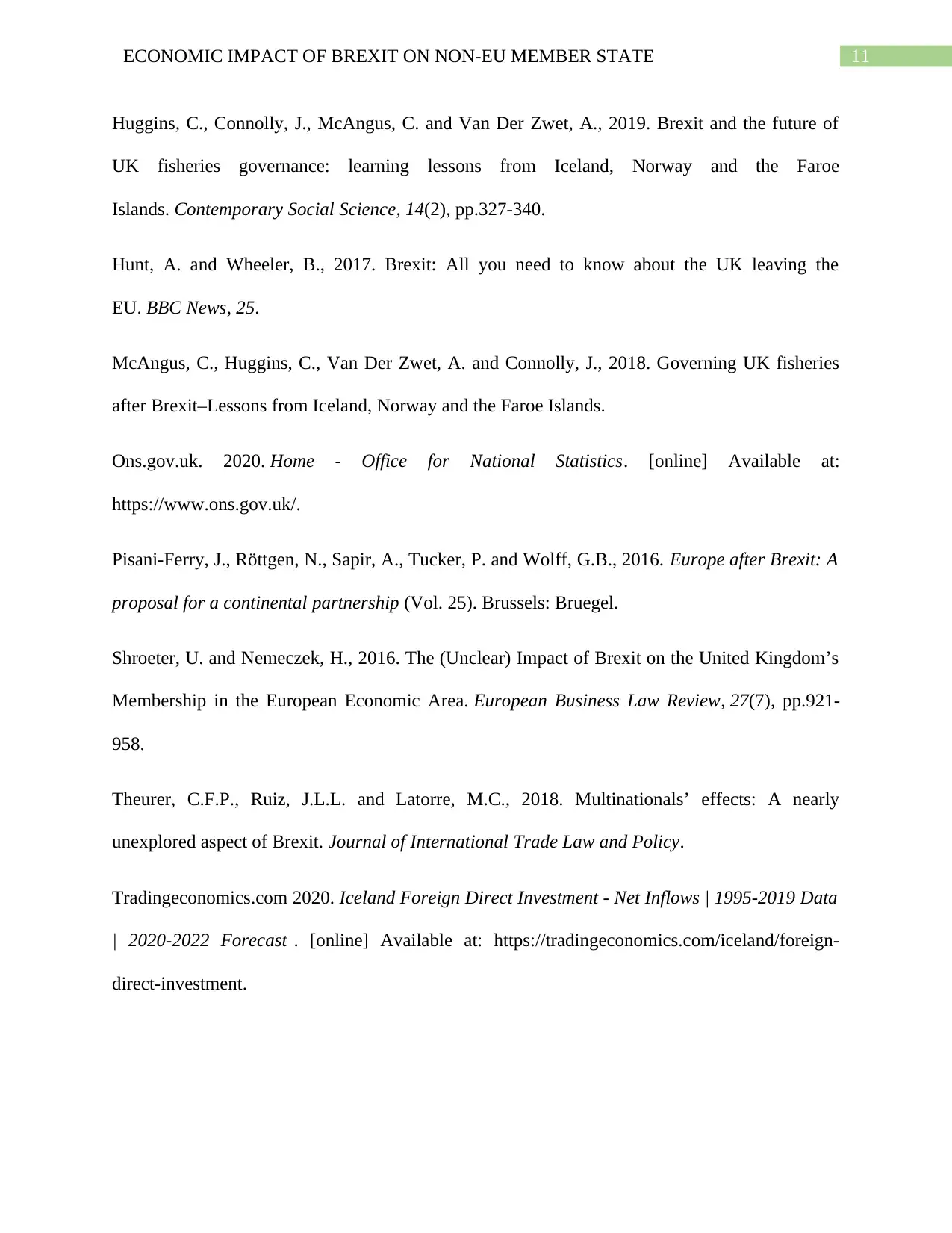
11ECONOMIC IMPACT OF BREXIT ON NON-EU MEMBER STATE
Huggins, C., Connolly, J., McAngus, C. and Van Der Zwet, A., 2019. Brexit and the future of
UK fisheries governance: learning lessons from Iceland, Norway and the Faroe
Islands. Contemporary Social Science, 14(2), pp.327-340.
Hunt, A. and Wheeler, B., 2017. Brexit: All you need to know about the UK leaving the
EU. BBC News, 25.
McAngus, C., Huggins, C., Van Der Zwet, A. and Connolly, J., 2018. Governing UK fisheries
after Brexit–Lessons from Iceland, Norway and the Faroe Islands.
Ons.gov.uk. 2020. Home - Office for National Statistics. [online] Available at:
https://www.ons.gov.uk/.
Pisani-Ferry, J., Röttgen, N., Sapir, A., Tucker, P. and Wolff, G.B., 2016. Europe after Brexit: A
proposal for a continental partnership (Vol. 25). Brussels: Bruegel.
Shroeter, U. and Nemeczek, H., 2016. The (Unclear) Impact of Brexit on the United Kingdom’s
Membership in the European Economic Area. European Business Law Review, 27(7), pp.921-
958.
Theurer, C.F.P., Ruiz, J.L.L. and Latorre, M.C., 2018. Multinationals’ effects: A nearly
unexplored aspect of Brexit. Journal of International Trade Law and Policy.
Tradingeconomics.com 2020. Iceland Foreign Direct Investment - Net Inflows | 1995-2019 Data
| 2020-2022 Forecast . [online] Available at: https://tradingeconomics.com/iceland/foreign-
direct-investment.
Huggins, C., Connolly, J., McAngus, C. and Van Der Zwet, A., 2019. Brexit and the future of
UK fisheries governance: learning lessons from Iceland, Norway and the Faroe
Islands. Contemporary Social Science, 14(2), pp.327-340.
Hunt, A. and Wheeler, B., 2017. Brexit: All you need to know about the UK leaving the
EU. BBC News, 25.
McAngus, C., Huggins, C., Van Der Zwet, A. and Connolly, J., 2018. Governing UK fisheries
after Brexit–Lessons from Iceland, Norway and the Faroe Islands.
Ons.gov.uk. 2020. Home - Office for National Statistics. [online] Available at:
https://www.ons.gov.uk/.
Pisani-Ferry, J., Röttgen, N., Sapir, A., Tucker, P. and Wolff, G.B., 2016. Europe after Brexit: A
proposal for a continental partnership (Vol. 25). Brussels: Bruegel.
Shroeter, U. and Nemeczek, H., 2016. The (Unclear) Impact of Brexit on the United Kingdom’s
Membership in the European Economic Area. European Business Law Review, 27(7), pp.921-
958.
Theurer, C.F.P., Ruiz, J.L.L. and Latorre, M.C., 2018. Multinationals’ effects: A nearly
unexplored aspect of Brexit. Journal of International Trade Law and Policy.
Tradingeconomics.com 2020. Iceland Foreign Direct Investment - Net Inflows | 1995-2019 Data
| 2020-2022 Forecast . [online] Available at: https://tradingeconomics.com/iceland/foreign-
direct-investment.
⊘ This is a preview!⊘
Do you want full access?
Subscribe today to unlock all pages.

Trusted by 1+ million students worldwide
1 out of 12
Related Documents
Your All-in-One AI-Powered Toolkit for Academic Success.
+13062052269
info@desklib.com
Available 24*7 on WhatsApp / Email
![[object Object]](/_next/static/media/star-bottom.7253800d.svg)
Unlock your academic potential
Copyright © 2020–2026 A2Z Services. All Rights Reserved. Developed and managed by ZUCOL.





